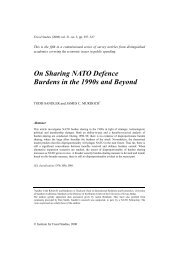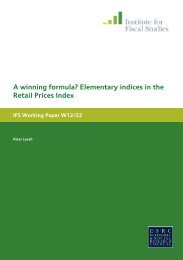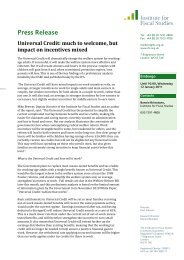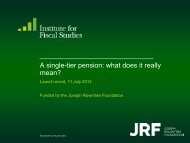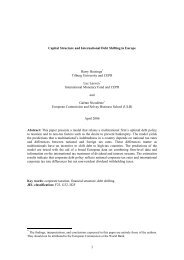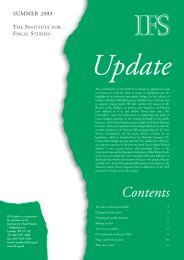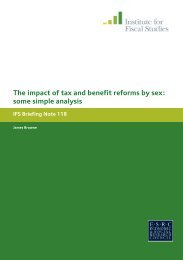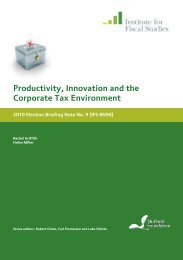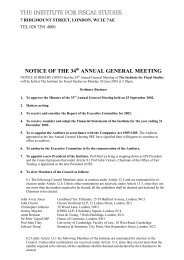A single-tier pension: what does it really mean? - The Institute For ...
A single-tier pension: what does it really mean? - The Institute For ...
A single-tier pension: what does it really mean? - The Institute For ...
You also want an ePaper? Increase the reach of your titles
YUMPU automatically turns print PDFs into web optimized ePapers that Google loves.
Short-run effect on <strong>pension</strong>er incomes<br />
Table 4.3. Percentage of individuals ent<strong>it</strong>led to more and less than the full<br />
<strong>single</strong>-<strong>tier</strong> amount, under current and proposed systems – assuming no<br />
contracting out<br />
State <strong>pension</strong> ent<strong>it</strong>lement<br />
Current system (no contracting out)<br />
Men Women All<br />
£1 or more below £146.30 p.w. 9.0 61.4 25.3<br />
W<strong>it</strong>hin £1 of £146.30 p.w. 0.8 2.1 1.2<br />
£1 or more above £146.30 p.w.<br />
Single-<strong>tier</strong> system (no contracting out)<br />
90.2 36.5 73.5<br />
£1 or more below £146.30 p.w. 4.9 32.9 13.6<br />
W<strong>it</strong>hin £1 of £146.30 p.w. 5.0 30.5 12.9<br />
£1 or more above £146.30 p.w. 90.2 36.5 73.5<br />
Sample size 741 334 1,075<br />
Source: Authors’ calculations using English Long<strong>it</strong>udinal Study of Ageing and National Insurance<br />
administrative data.<br />
who have private <strong>pension</strong> ent<strong>it</strong>lements funded by rebates from (or lower<br />
contributions to) the state to apply no reduction to their <strong>single</strong>-<strong>tier</strong> amount in<br />
recogn<strong>it</strong>ion of their years of contracting out. In fact, the trans<strong>it</strong>ion arrangements<br />
chosen, which allow those who have been contracted out in the past to work this<br />
off, already treat this group more generously than otherwise-identical individuals<br />
who have been contracted in.<br />
Characteristics of immediate winners and losers<br />
Table 4.2 showed that 25% of individuals will already have ent<strong>it</strong>lement under the<br />
current system of at least £146.30 by 2016. <strong>The</strong> protection of existing accruals<br />
<strong>mean</strong>s that these people will experience essentially no change in their state<br />
<strong>pension</strong> income at SPA under the new system. In add<strong>it</strong>ion, 59% of people would<br />
be ent<strong>it</strong>led to less than £146.30 under the current system but would also<br />
experience no increase in their income as a result of the new system. Meanwhile,<br />
18% of the sample would see their state <strong>pension</strong> ent<strong>it</strong>lements increased (and<br />
10% would experience an increase of £10 a week or more). Just 4% would see<br />
their rights reduced.<br />
As alluded to in Chapter 3, different groups of people are affected by the reform<br />
in different ways. <strong>For</strong> example, those who have had periods of self-employment<br />
are likely to be relative winners, as they have previously only earned ent<strong>it</strong>lement<br />
to the BSP. In order to understand the full impact of the reform, <strong>it</strong> is therefore<br />
interesting to examine the characteristics of those affected in different ways by<br />
the proposed <strong>single</strong>-<strong>tier</strong> <strong>pension</strong>.<br />
Of those who gain at least £10 per week of state <strong>pension</strong> income at SPA, 73% are<br />
women, 53% of them are in the lowest education group and 39% have been selfemployed<br />
at some point in the past. On average, this group has spent 11 years in<br />
employment since 1975. In contrast, among those whose ent<strong>it</strong>lement under the<br />
current system will already exceed £146.30 in 2016 and who therefore<br />
experience no increase in their state <strong>pension</strong> income at SPA, 89% are men, 43%<br />
are in the lowest education group and 27% have been self-employed. This group<br />
33



